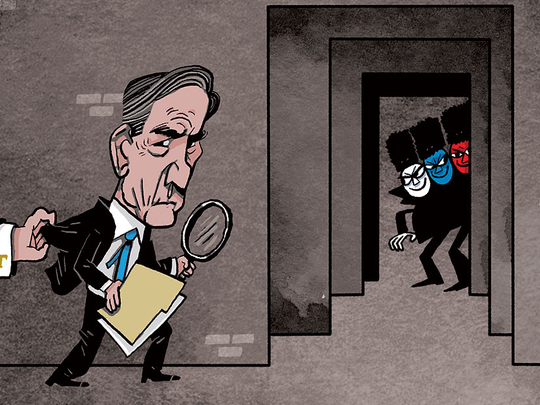
On the eve of Presidents’ Day weekend, the indictments of 13 Russians for interfering in the 2016 presidential election in the United States are a wake-up call for all Americans, regardless of political stripe or party affiliation. It shows the enormous responsibility on Special Counsel Robert Mueller’s shoulders to keep the country and its democratic system safe from their Kremlin adversaries.
The indictment includes a bold statement from the Russian group itself about its mission: “Information warfare against the United States of America.” For the sake of America’s future, we must let Mueller and the FBI now do their job without political interference or distraction.
Mueller’s mandate is primarily a counter-intelligence investigation, with the add-on authority to pursue criminal indictments for any wrongdoing he discovers along the way. We should have already been long past the time where it could be possible to call this investigation a political “witch hunt” or to label Russian involvement in the election to buttress Donald Trump “fake news”. But Friday marked a change. There is nothing more clarifying than a criminal indictment.
The special counsel’s team has uncovered a vast organisational operation that the Russians started building in 2014, and accelerated with a budget of more than $1.25 million (Dh4.59 million) monthly during the 2016 election. The Russians did not just go after Democratic candidate Hillary Clinton in the general election. They also undertook efforts primarily intended “to denigrate other candidates such as Ted Cruz and Marco Rubio”, according to the indictment. If it wasn’t clear before Friday: The threat to America includes Russia’s attempts to sow discord among Americans in general, and to shape the Republican primaries. All Americans stand to lose by being robbed of their democratic choices.
Trying to get beyond partisan politics, it was a wise move to have Rod Rosenstein, the Deputy Attorney General, a Republican, publicly announce the indictments by Mueller, a Republican, for Russian activities not only to hurt Clinton, but also Republican candidates for president. It was also a good symbol to elevate the public’s understanding of the seriousness of Rosenstein’s charge and why he has such great confidence in Mueller.
And yet, Friday’s indictments cover just one part of the multi-headed Russian operation. They detail the Russians’ use of social media platforms to shape preferences and to engineer political rallies. A separate FBI team is investigating Russian agents for hacking the Democratic National Committee during the election. Mueller is reportedly keenly interested in Russian agents’ offering “dirt” on Clinton to campaign associates of Trump. And then there’s still the issue of Russian collaboration with WikiLeaks. As with his previous indictments, Mueller kept the rest of his hand closely guarded.
It is the case that this round of indictments may help build a future case for any American who aided and abetted or conspired with the Russians in any of the Kremlin’s different operations to interfere in the election. Mueller obviously now appears to have not just intelligence information, but also sufficient evidence for a criminal trial. And he has that evidence to prove a Russian conspiracy in “impairing, obstructing, and defeating the lawful functions of the government through fraud and deceit for the purpose of interfering with the US political and electoral processes, including the presidential election of 2016”. That’s a mouthful, but it captures the scope of the criminal case.
The indictment tells us that some Trump campaign associates, especially at the grass-roots level, cooperated with the Russians “unwittingly”. That makes sense. As Rosenstein explained, in answer to a reporter’s question, these parts of the operation depended on Russians’ disguising their identities and duping innocent Americans. According to Mueller’s other criminal court documents, that was certainly not the case when it came to Russian overtures to more senior levels of the Trump campaign, for example, in offering dirt on Clinton in the form of “thousands of emails”.
But let the chips fall where they may. If Americans deliberately assisted the Kremlin’s “information warfare against the United States of America”, then America needs to know about it — at the very least as part of a counter-intelligence investigation. If these Americans were “unwitting”, it is important to know how the Russians exploited such vulnerabilities and for Mueller’s investigation to educate the government and the public.
Friday’s indictments raise the stakes for America enormously. President Trump and some of his most loyal supporters on the Capitol Hill must let Mueller and the FBI complete the task. It should be all too real to Americans, what the costs are for their democratic system and their national security if public servants like Rosenstein, Mueller and the FBI are delayed or disrupted in their mission.
— New York Times News Service
Ryan Goodman is a professor of Law at New York University and editor-in-chief of the blog Just Security.









